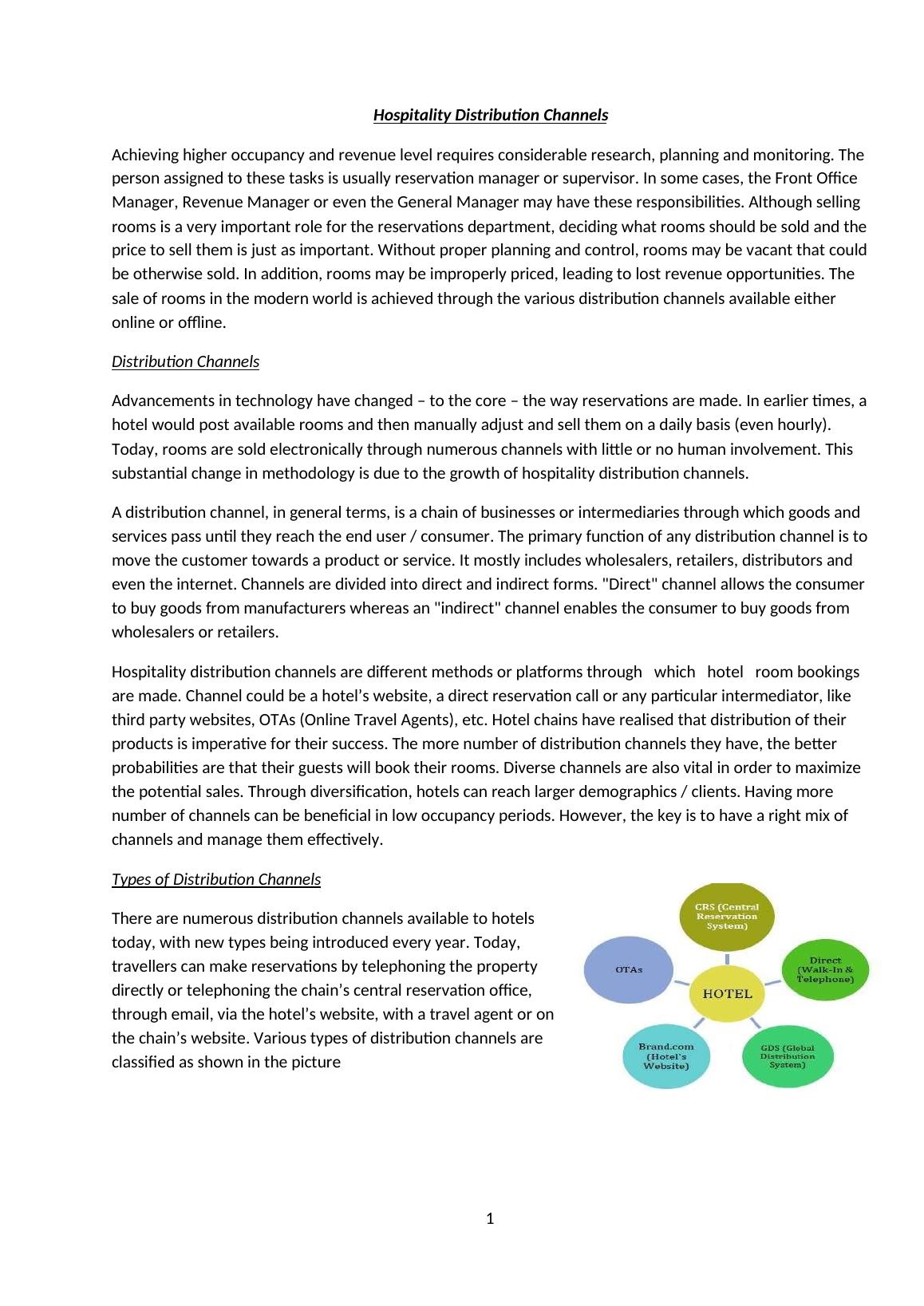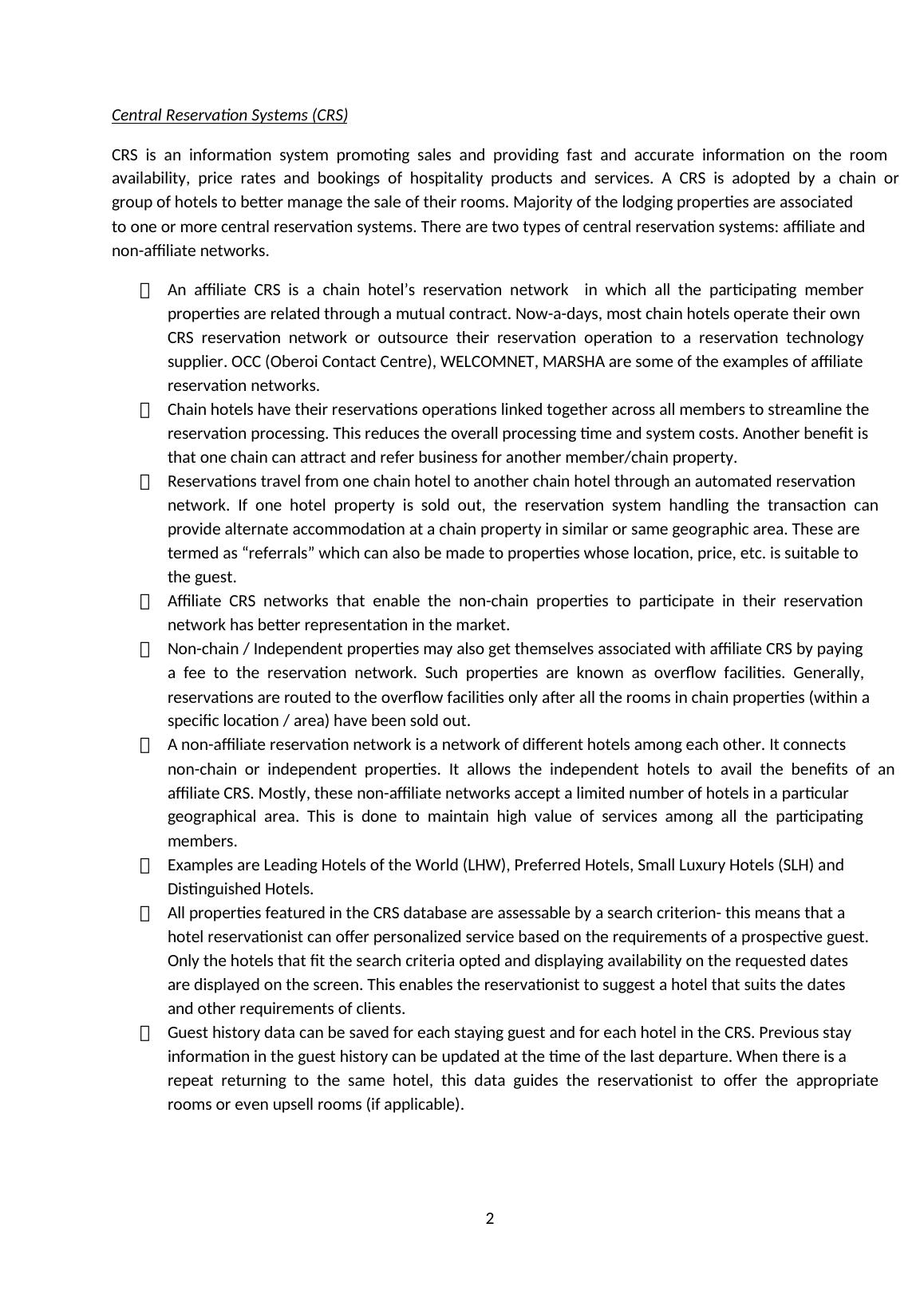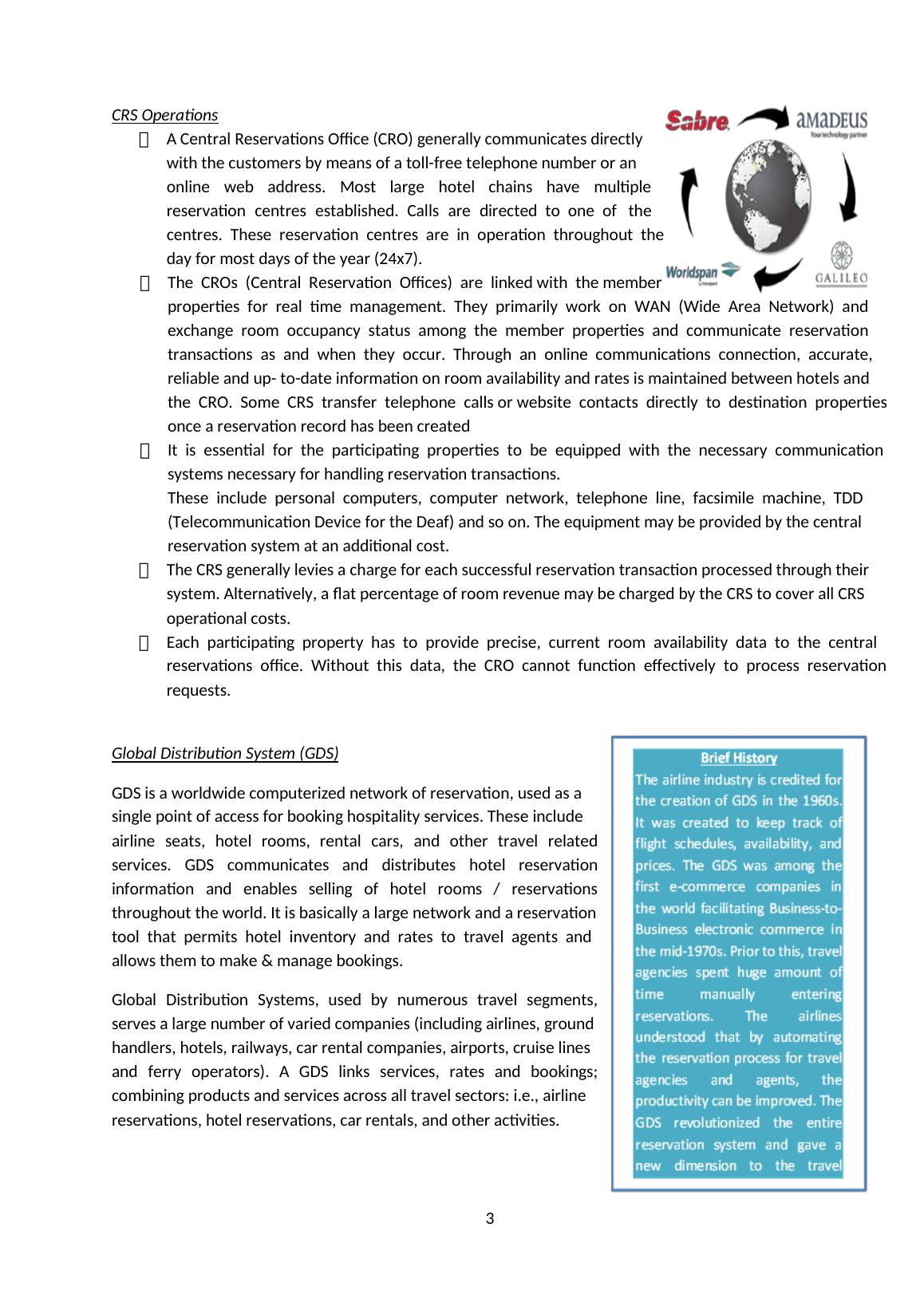Hospitality Distribution Channels PDF
Added on 2022-01-17
9 Pages4084 Words134 Views
1
Hospitality Distribution Channels
Achieving higher occupancy and revenue level requires considerable research, planning and monitoring. The
person assigned to these tasks is usually reservation manager or supervisor. In some cases, the Front Office
Manager, Revenue Manager or even the General Manager may have these responsibilities. Although selling
rooms is a very important role for the reservations department, deciding what rooms should be sold and the
price to sell them is just as important. Without proper planning and control, rooms may be vacant that could
be otherwise sold. In addition, rooms may be improperly priced, leading to lost revenue opportunities. The
sale of rooms in the modern world is achieved through the various distribution channels available either
online or offline.
Distribution Channels
Advancements in technology have changed – to the core – the way reservations are made. In earlier times, a
hotel would post available rooms and then manually adjust and sell them on a daily basis (even hourly).
Today, rooms are sold electronically through numerous channels with little or no human involvement. This
substantial change in methodology is due to the growth of hospitality distribution channels.
A distribution channel, in general terms, is a chain of businesses or intermediaries through which goods and
services pass until they reach the end user / consumer. The primary function of any distribution channel is to
move the customer towards a product or service. It mostly includes wholesalers, retailers, distributors and
even the internet. Channels are divided into direct and indirect forms. "Direct" channel allows the consumer
to buy goods from manufacturers whereas an "indirect" channel enables the consumer to buy goods from
wholesalers or retailers.
Hospitality distribution channels are different methods or platforms through which hotel room bookings
are made. Channel could be a hotel’s website, a direct reservation call or any particular intermediator, like
third party websites, OTAs (Online Travel Agents), etc. Hotel chains have realised that distribution of their
products is imperative for their success. The more number of distribution channels they have, the better
probabilities are that their guests will book their rooms. Diverse channels are also vital in order to maximize
the potential sales. Through diversification, hotels can reach larger demographics / clients. Having more
number of channels can be beneficial in low occupancy periods. However, the key is to have a right mix of
channels and manage them effectively.
Types of Distribution Channels
There are numerous distribution channels available to hotels
today, with new types being introduced every year. Today,
travellers can make reservations by telephoning the property
directly or telephoning the chain’s central reservation office,
through email, via the hotel’s website, with a travel agent or on
the chain’s website. Various types of distribution channels are
classified as shown in the picture
Hospitality Distribution Channels
Achieving higher occupancy and revenue level requires considerable research, planning and monitoring. The
person assigned to these tasks is usually reservation manager or supervisor. In some cases, the Front Office
Manager, Revenue Manager or even the General Manager may have these responsibilities. Although selling
rooms is a very important role for the reservations department, deciding what rooms should be sold and the
price to sell them is just as important. Without proper planning and control, rooms may be vacant that could
be otherwise sold. In addition, rooms may be improperly priced, leading to lost revenue opportunities. The
sale of rooms in the modern world is achieved through the various distribution channels available either
online or offline.
Distribution Channels
Advancements in technology have changed – to the core – the way reservations are made. In earlier times, a
hotel would post available rooms and then manually adjust and sell them on a daily basis (even hourly).
Today, rooms are sold electronically through numerous channels with little or no human involvement. This
substantial change in methodology is due to the growth of hospitality distribution channels.
A distribution channel, in general terms, is a chain of businesses or intermediaries through which goods and
services pass until they reach the end user / consumer. The primary function of any distribution channel is to
move the customer towards a product or service. It mostly includes wholesalers, retailers, distributors and
even the internet. Channels are divided into direct and indirect forms. "Direct" channel allows the consumer
to buy goods from manufacturers whereas an "indirect" channel enables the consumer to buy goods from
wholesalers or retailers.
Hospitality distribution channels are different methods or platforms through which hotel room bookings
are made. Channel could be a hotel’s website, a direct reservation call or any particular intermediator, like
third party websites, OTAs (Online Travel Agents), etc. Hotel chains have realised that distribution of their
products is imperative for their success. The more number of distribution channels they have, the better
probabilities are that their guests will book their rooms. Diverse channels are also vital in order to maximize
the potential sales. Through diversification, hotels can reach larger demographics / clients. Having more
number of channels can be beneficial in low occupancy periods. However, the key is to have a right mix of
channels and manage them effectively.
Types of Distribution Channels
There are numerous distribution channels available to hotels
today, with new types being introduced every year. Today,
travellers can make reservations by telephoning the property
directly or telephoning the chain’s central reservation office,
through email, via the hotel’s website, with a travel agent or on
the chain’s website. Various types of distribution channels are
classified as shown in the picture

2
Central Reservation Systems (CRS)
CRS is an information system promoting sales and providing fast and accurate information on the room
availability, price rates and bookings of hospitality products and services. A CRS is adopted by a chain or
group of hotels to better manage the sale of their rooms. Majority of the lodging properties are associated
to one or more central reservation systems. There are two types of central reservation systems: affiliate and
non-affiliate networks.
An affiliate CRS is a chain hotel’s reservation network in which all the participating member
properties are related through a mutual contract. Now-a-days, most chain hotels operate their own
CRS reservation network or outsource their reservation operation to a reservation technology
supplier. OCC (Oberoi Contact Centre), WELCOMNET, MARSHA are some of the examples of affiliate
reservation networks.
Chain hotels have their reservations operations linked together across all members to streamline the
reservation processing. This reduces the overall processing time and system costs. Another benefit is
that one chain can attract and refer business for another member/chain property.
Reservations travel from one chain hotel to another chain hotel through an automated reservation
network. If one hotel property is sold out, the reservation system handling the transaction can
provide alternate accommodation at a chain property in similar or same geographic area. These are
termed as “referrals” which can also be made to properties whose location, price, etc. is suitable to
the guest.
Affiliate CRS networks that enable the non-chain properties to participate in their reservation
network has better representation in the market.
Non-chain / Independent properties may also get themselves associated with affiliate CRS by paying
a fee to the reservation network. Such properties are known as overflow facilities. Generally,
reservations are routed to the overflow facilities only after all the rooms in chain properties (within a
specific location / area) have been sold out.
A non-affiliate reservation network is a network of different hotels among each other. It connects
non-chain or independent properties. It allows the independent hotels to avail the benefits of an
affiliate CRS. Mostly, these non-affiliate networks accept a limited number of hotels in a particular
geographical area. This is done to maintain high value of services among all the participating
members.
Examples are Leading Hotels of the World (LHW), Preferred Hotels, Small Luxury Hotels (SLH) and
Distinguished Hotels.
All properties featured in the CRS database are assessable by a search criterion- this means that a
hotel reservationist can offer personalized service based on the requirements of a prospective guest.
Only the hotels that fit the search criteria opted and displaying availability on the requested dates
are displayed on the screen. This enables the reservationist to suggest a hotel that suits the dates
and other requirements of clients.
Guest history data can be saved for each staying guest and for each hotel in the CRS. Previous stay
information in the guest history can be updated at the time of the last departure. When there is a
repeat returning to the same hotel, this data guides the reservationist to offer the appropriate
rooms or even upsell rooms (if applicable).
Central Reservation Systems (CRS)
CRS is an information system promoting sales and providing fast and accurate information on the room
availability, price rates and bookings of hospitality products and services. A CRS is adopted by a chain or
group of hotels to better manage the sale of their rooms. Majority of the lodging properties are associated
to one or more central reservation systems. There are two types of central reservation systems: affiliate and
non-affiliate networks.
An affiliate CRS is a chain hotel’s reservation network in which all the participating member
properties are related through a mutual contract. Now-a-days, most chain hotels operate their own
CRS reservation network or outsource their reservation operation to a reservation technology
supplier. OCC (Oberoi Contact Centre), WELCOMNET, MARSHA are some of the examples of affiliate
reservation networks.
Chain hotels have their reservations operations linked together across all members to streamline the
reservation processing. This reduces the overall processing time and system costs. Another benefit is
that one chain can attract and refer business for another member/chain property.
Reservations travel from one chain hotel to another chain hotel through an automated reservation
network. If one hotel property is sold out, the reservation system handling the transaction can
provide alternate accommodation at a chain property in similar or same geographic area. These are
termed as “referrals” which can also be made to properties whose location, price, etc. is suitable to
the guest.
Affiliate CRS networks that enable the non-chain properties to participate in their reservation
network has better representation in the market.
Non-chain / Independent properties may also get themselves associated with affiliate CRS by paying
a fee to the reservation network. Such properties are known as overflow facilities. Generally,
reservations are routed to the overflow facilities only after all the rooms in chain properties (within a
specific location / area) have been sold out.
A non-affiliate reservation network is a network of different hotels among each other. It connects
non-chain or independent properties. It allows the independent hotels to avail the benefits of an
affiliate CRS. Mostly, these non-affiliate networks accept a limited number of hotels in a particular
geographical area. This is done to maintain high value of services among all the participating
members.
Examples are Leading Hotels of the World (LHW), Preferred Hotels, Small Luxury Hotels (SLH) and
Distinguished Hotels.
All properties featured in the CRS database are assessable by a search criterion- this means that a
hotel reservationist can offer personalized service based on the requirements of a prospective guest.
Only the hotels that fit the search criteria opted and displaying availability on the requested dates
are displayed on the screen. This enables the reservationist to suggest a hotel that suits the dates
and other requirements of clients.
Guest history data can be saved for each staying guest and for each hotel in the CRS. Previous stay
information in the guest history can be updated at the time of the last departure. When there is a
repeat returning to the same hotel, this data guides the reservationist to offer the appropriate
rooms or even upsell rooms (if applicable).

3
CRS Operations
A Central Reservations Office (CRO) generally communicates directly
with the customers by means of a toll-free telephone number or an
online web address. Most large hotel chains have multiple
reservation centres established. Calls are directed to one of the
centres. These reservation centres are in operation throughout the
day for most days of the year (24x7).
The CROs (Central Reservation Offices) are linked with the member
properties for real time management. They primarily work on WAN (Wide Area Network) and
exchange room occupancy status among the member properties and communicate reservation
transactions as and when they occur. Through an online communications connection, accurate,
reliable and up- to-date information on room availability and rates is maintained between hotels and
the CRO. Some CRS transfer telephone calls or website contacts directly to destination properties
once a reservation record has been created
It is essential for the participating properties to be equipped with the necessary communication
systems necessary for handling reservation transactions.
These include personal computers, computer network, telephone line, facsimile machine, TDD
(Telecommunication Device for the Deaf) and so on. The equipment may be provided by the central
reservation system at an additional cost.
The CRS generally levies a charge for each successful reservation transaction processed through their
system. Alternatively, a flat percentage of room revenue may be charged by the CRS to cover all CRS
operational costs.
Each participating property has to provide precise, current room availability data to the central
reservations office. Without this data, the CRO cannot function effectively to process reservation
requests.
Global Distribution System (GDS)
GDS is a worldwide computerized network of reservation, used as a
single point of access for booking hospitality services. These include
airline seats, hotel rooms, rental cars, and other travel related
services. GDS communicates and distributes hotel reservation
information and enables selling of hotel rooms / reservations
throughout the world. It is basically a large network and a reservation
tool that permits hotel inventory and rates to travel agents and
allows them to make & manage bookings.
Global Distribution Systems, used by numerous travel segments,
serves a large number of varied companies (including airlines, ground
handlers, hotels, railways, car rental companies, airports, cruise lines
and ferry operators). A GDS links services, rates and bookings;
combining products and services across all travel sectors: i.e., airline
reservations, hotel reservations, car rentals, and other activities.
CRS Operations
A Central Reservations Office (CRO) generally communicates directly
with the customers by means of a toll-free telephone number or an
online web address. Most large hotel chains have multiple
reservation centres established. Calls are directed to one of the
centres. These reservation centres are in operation throughout the
day for most days of the year (24x7).
The CROs (Central Reservation Offices) are linked with the member
properties for real time management. They primarily work on WAN (Wide Area Network) and
exchange room occupancy status among the member properties and communicate reservation
transactions as and when they occur. Through an online communications connection, accurate,
reliable and up- to-date information on room availability and rates is maintained between hotels and
the CRO. Some CRS transfer telephone calls or website contacts directly to destination properties
once a reservation record has been created
It is essential for the participating properties to be equipped with the necessary communication
systems necessary for handling reservation transactions.
These include personal computers, computer network, telephone line, facsimile machine, TDD
(Telecommunication Device for the Deaf) and so on. The equipment may be provided by the central
reservation system at an additional cost.
The CRS generally levies a charge for each successful reservation transaction processed through their
system. Alternatively, a flat percentage of room revenue may be charged by the CRS to cover all CRS
operational costs.
Each participating property has to provide precise, current room availability data to the central
reservations office. Without this data, the CRO cannot function effectively to process reservation
requests.
Global Distribution System (GDS)
GDS is a worldwide computerized network of reservation, used as a
single point of access for booking hospitality services. These include
airline seats, hotel rooms, rental cars, and other travel related
services. GDS communicates and distributes hotel reservation
information and enables selling of hotel rooms / reservations
throughout the world. It is basically a large network and a reservation
tool that permits hotel inventory and rates to travel agents and
allows them to make & manage bookings.
Global Distribution Systems, used by numerous travel segments,
serves a large number of varied companies (including airlines, ground
handlers, hotels, railways, car rental companies, airports, cruise lines
and ferry operators). A GDS links services, rates and bookings;
combining products and services across all travel sectors: i.e., airline
reservations, hotel reservations, car rentals, and other activities.

End of preview
Want to access all the pages? Upload your documents or become a member.
Related Documents
Product Distribution and Revenue Managementlg...
|7
|1815
|130
Tourism Distribution Systems: Evolution, Role of Technology and Futurelg...
|10
|1790
|238
Distribution Channels in Hotel Operations Managementlg...
|8
|1851
|70
1. DISCUSSION. REVENUE MANAGEMENT. Revenue management ilg...
|3
|367
|223
Hotel Revenue Management: Distribution Channels and Maximizing Revenuelg...
|7
|2328
|53
learning objectives assignment PDFlg...
|22
|884
|52
